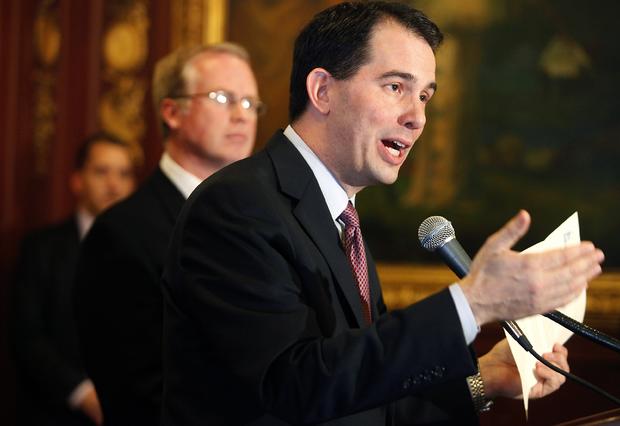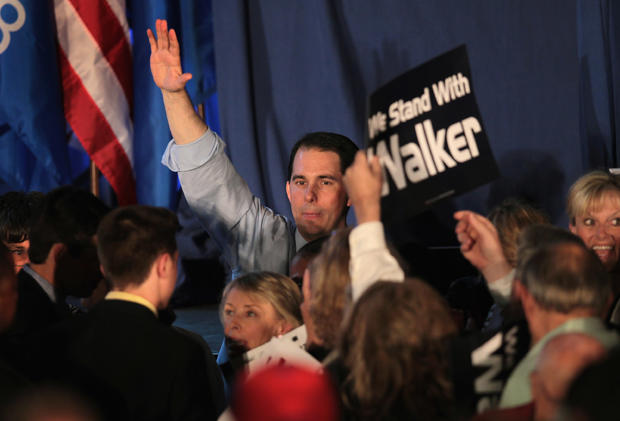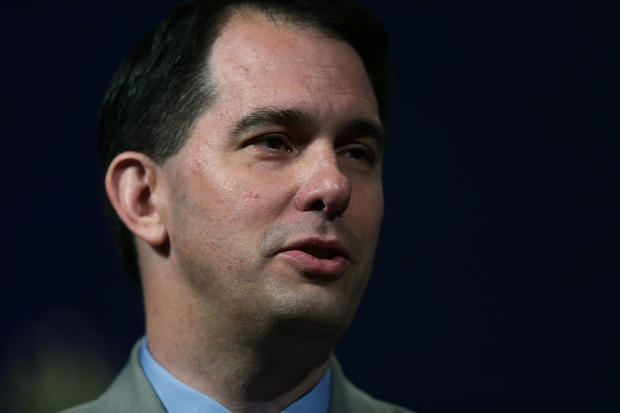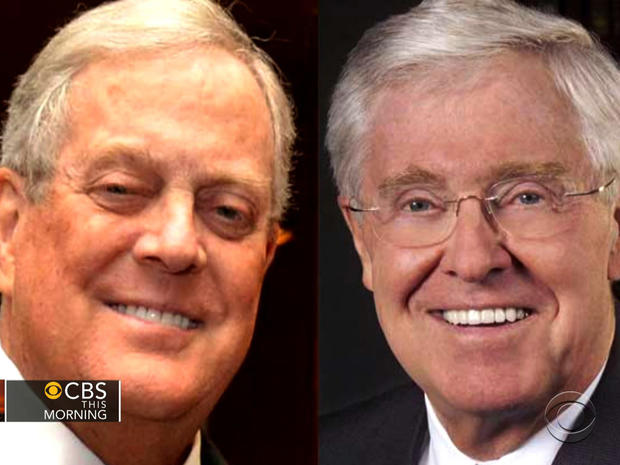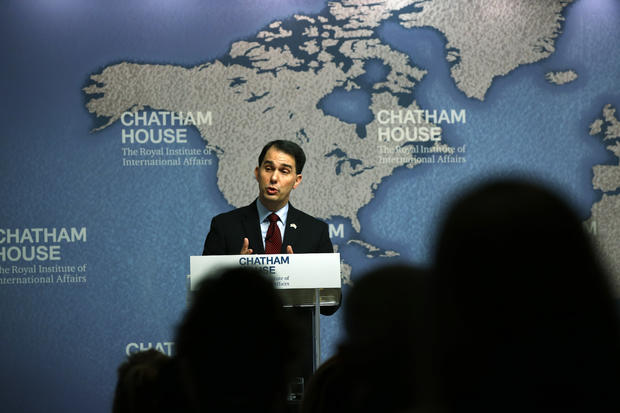Five things to know about Scott Walker
The end is finally in sight for the growing field of Republican presidential candidates, with Wisconsin Gov. Scott Walker officially stepping into the race Monday. He's the 15th Republican competing for the nomination in 2016, and one of the last, with only Ohio Gov. John Kasich expected to follow soon.
On Monday morning, he tweeted, "I'm in. I'm running for president because Americans deserve a leader who will fight and win for them."
Though Walker's formal announcement is relatively late, his entry into the field has long been expected. He has proven to be one of the more exciting prospects for Republican voters and so far has consistently polled among the top two or three candidates in the GOP field throughout the first half of the year.
Walker spent his early years in Iowa with his family before moving to Wisconsin at age 10. Now, he's pitching himself as a hardworking Midwesterner who can relate to everyday Americans - in part by sharing his love of bargain-hunting summed up in an oft-told anecdote about the Midwest department store, Kohl's.
"I went to a Kohl's department store and I bought something for the price it was marked at," Walker told social conservative activists at the Iowa Freedom Summit in January. "My wife said to me, 'You can never go back there ever again until you learn how to shop at Kohl's.'"
And, his story goes, he watched for markdowns, coupons in the Sunday circular, in the mail - and then pulled out his wife's Kohl's rewards card, and, "the next thing you know they are paying me to buy that shirt!" he exclaimed. The crowd went wild.
Voters in the early-voting states are also sure to hear Walker touting his tenure as Wisconsin governor as proof of his commitment to conservative ideals.
Here are five things to know about Scott Walker.
As governor Walker fought with unions
It was Walker's decision to take on organized labor that made him a national name - and a profile in courage for conservative activists. In 2011, Walker proposed a bill that would have eliminated collective bargaining rights for most public employee unions in Wisconsin. The move sparked raucous protests at the State Capitol building in Madison and prompted Democratic state lawmakers to literally flee the state to deprive Republicans of the votes needed to proceed.
The bill ultimately passed - over the objections of Democrats and unions - but the furor surrounding its passage resulted in an effort to recall Walker from office. After a fierce battle, Walker prevailed on June 5, 2012, becoming the first governor in U.S. history to survive a recall attempt.
"He's the strongest anti-union Republican in the bunch, and that's an issue that resonates both with average Republicans, but also with business Republicans that give a lot of money to the party," Julian Zelizer, a presidential historian at Princeton University, told CBS News earlier this year. "It defines him."
Walker won three elections in four years
Walker's victory in the 2012 recall election - where he prevailed with 53.1 percent, compared to just 46.3 percent for Milwaukee Mayor Tom Barrett - was just one of three statewide elections he's competed in since 2010.
His first gubernatorial election was in 2010, when he also competed against Barrett. He actually won that election by a slightly smaller margin, winning 52.3 percent of the vote to Barrett's 46.5 percent.
The result was almost identical when he ran for re-election in 2014, about two and a half years after he survived the recall. Walker won with 52.3 percent of the vote while his opponent, former Trek Bicycle Executive Mary Burke, got 46.6 percent of the vote. It was a good year for Republicans all around, and the GOP managed to retake the Senate that fall. But Democrats put up a fight for Wisconsin, which went to President Obama in both the 2008 and 2012 elections, and the president came to campaign with Burke. Still, Walker was victorious.
He was no stranger to elections by the time he ran for governor. Walker ran for his first political office at 22 years old, narrowly losing a race for a seat in the State Assembly. Three years later, he ran again for the assembly and won. He legislated for almost a decade before winning the post of Milwaukee County Executive. He stayed in that job until 2010, when he ran for governor the first time.
He never finished college
If Walker wins the presidency, he would be the first occupant of the Oval Office without his college degree since Harry Truman.
He attended Marquette University through the spring of 1990, his senior year of college, before quitting to take a full-time job at the American Red Cross.
"I thought I would squeeze in a course here or there and finish things off in a year or two, but then Tonette and I got married," Walker said in his 2013 State of the State speech. "Next thing you know, you're putting all your extra time and money into your kids."
A Washington Post investigation of Walker's time at school suggested that he might have paid more attention to his campaign for student body president than his education.
"He had managed to line up 47 campaign endorsements, including ones from the ski team and the varsity chorus, but he had trouble showing up on time for French," the reporter wrote.
Wisconsin Democrats have also long suggested there was something more nefarious behind his early exit, claiming he was kicked out of the school for a plot to steal copies of the student newspaper after it endorsed his opponent in a student body president election.
When Politifact Wisconsin asked Walker to allow Marquette to comment on his record in 2013, Walker agreed to it.
"Gov. Scott Walker was a student at Marquette from fall of 1986 until spring 1990 and was a senior in good standing when he voluntarily withdrew from Marquette," the university said in a statement. An addition letter from the associate vice provost confirmed that Walker was "in good standing" during each term he attended the school.
Walker has defended his decision in the past and rejected arguments that not having a college degree is problematic.
"That's the kind of elitist, government-knows-best, top-down approach we've had for years," he told Fox News earlier this year. "I'd rather have a fighter who's proven he can take on the big government interests and win."
Billionaire Koch brothers like him
Charles and David Koch, the billionaire industrialists and major conservative donors, have said they plan to spend nearly $900 million on the 2016 election through Freedom Partners, the hub for their various activist groups. For months, Republican politicians including Sens. Marco Rubio of Florida, Ted Cruz of Texas and Rand Paul of Kentucky have accepted speaking invitations and sought meetings with the brothers to win their backing.
In April, the New York Times reported that David Koch indicated he believes Walker should be the GOP nominee, according to people who heard him speak at a fundraising event for the New York State Republican Party. A spokeswoman said that he had pledged to remain officially neutral during the primary campaign.
Should that change, however - or if the brothers decide to give personally to a candidate, even while their political organizations stay out of the Republican primary - that could mean a lot for a candidate competing against the well-financed former Florida Gov. Jeb Bush. The super PAC supporting Bush announced it had raised more than $103 million in the first six months of 2015 on top of the $11.4 million Bush's campaign raised during his first 16 days in the race.
He's had to play catch-up on foreign policy
Like some of the other governors seeking the GOP nomination, Walker has turned to various Republican foreign policy experts to give him a crash-course tutorial on the ways of the world.
For Walker in particular, there were a few public blunders that highlighted the lack of attention he's paid to foreign affairs in the months leading up to his campaign.
During a Q&A session with members of the Club for Growth in Florida earlier this year, for example, he raised some eyebrows by claiming the most significant policy decision of his lifetime was former President Ronald Reagan's actions to break up a 1981 strike by air traffic controllers, according to the Washington Post. During a foreign trip to London in February, he avoided having to answer foreign policy questions.
And during a speech at the Conservative Political Action Committee last month, Walker suggested his experience dealing with protesters in Wisconsin proves he has the mettle to take on ISIS and America's foreign foes. "If I can take on 100,000 protesters, I can do the same across the world," he said.
A learning curve on foreign policy "is a challenge faced by a lot of governors who run for president," Zelizer told CBS News in February. "There are always those questions that trip them up."
"If Hillary Clinton is the opponent," he added, "a lot of Republicans will be wondering how will [Walker] will deal with her in that arena, especially if foreign policy issues loom large."
But Walker has already promised he'll be ready to challenge former Secretary of State Hillary Clinton if she's the nominee.
"If I choose to get in this race, [foreign policy is] something I'm going to lay out a very clear plan for what we should do going forward, and how we should address the issues we face here in America and the issues we face around the world. I think there's a wide open door to lay out a very clear doctrine. And I do think that if foreign policy plays an important role, the contrast would be clear," Walker said on CBS' "Face the Nation."
